|
4/5/2021 0 Comments The Disappointed SOnDisappointment is a fact of life, something everyone will often encounter, but no matter how old we are the experience is, well, disappointing, LOL. As parents we want to give our children everything that they need and maybe all that they want, but we know that for many reasons this is not realistic.
Mom, your refusal to allow your son to play football resonates with me, because my husband and I refuse to allow our son to play football due to the potential for brain injury and the hypermasculinity and misogyny that often go hand in hand with football. You are well within your rights as a parent to protect your child from documented risks. The NFL acknowledges that there is a link between football related head trauma and chronic traumatic encephalopathy among professional players. You understand the risks, but your son just wants to play, so he is probably not hearing you, but make sure that you listen to him and validate his feelings and try to clearly explain to your son why you do not want him to play. Together you all can research the risks and turn it into a presentation for family and friends. Hopefully this activity will allow your son to understand, why you refuse to allow him to play, even if his mind is not changed. Have you all discussed other sports? Would flag football suffice? Touch football? Maybe Soccer? What about Lacrosse? Are you willing to allow him to try different sports so that he can discover a new passion? Like most children, your son is going to try to wear you down, if he is not swayed from playing football. Hopefully you don't take the requests personally. If you do, please don't. His asking has nothing to do with you. Playing football is important to him, so he asks because he wants to play, so remain mindful of this in your response. Keep in mind that if he goes to college he could always walk on a team and play. If this happens, all that you can do is tuck away your disappointment and support your son in an activity that he loves. For now though, validate and affirm your son's disappointments and feelings and help him to find another sport or sports to play.
0 Comments
What a great question! To begin, let's first dissect the meaning of Conscious and Parent. ConsciousParentSo,A parent is one who cares for their offspring. Consciousness is being aware. Now What Does that really Mean?The parenting part is probably easy for most people to understand, but the idea of awareness within parenting is what many people don't understand. Consciousness in parenting is:
In summaryConscious parenting requires me as the parent to accept my child for who she is in this moment, and to understand what is causing her current struggle, so that I can help my child to overcome that obstacle and then teach her lessons to help her to identify when something is wrong and how to work to address the problem the next time it occurs. I also will teach her how to apply the lessons that we learned with one situation to another situation.
My goal is not to make my child suffer, or to cause discomfort. Life will be the source of her discomfort. My goal is to provide my child with the tools to address what goes wrong in her life by the result of her actions or through the process of living, with a calm mind, rational thinking and purpose. 3/31/2021 0 Comments SPit and TearsWhat do I think?I think that instead of posting this video on social media for the world to see, mom should have:
Suggestions?Mom needs take a few courses on child development or read a few books on the topic and learn how to engage with an angry human being, especially one who is young and is learning how to remain rational when angry. Somewhere someone is thinking to themselves that this child is a spoiled entitled brat who wants to have her own way for having a temper tantrum. The child in the video is most likely a normal child who wants something that she cannot have, and denying the request for the gum, while explaining why she cannot have the gum and not giving in to the angry demands is part of the learning (discipline) process for young children. Children do not come into this world “knowing better”. Children come into this world knowing nothing more than how to eat. Babies can literally forget to breathe. Over the course of years and months they learn the skills needed to survive in this world, and that includes managing their own behaviors which is acquired through the practice and trial and error of co-regulating behaviors with an adult who has placed their ego aside and is not offended by the actions of someone who literally does not know better.
My youngest child, whose diet consisted of about 60 - 70% breast milk and 30 - 40% solid foods, was iron deficient at one year of age. He ate a pretty varied diet, but he did not eat enough of any food to consume the amount of iron that was needed to raise his iron levels or iron store. His iron level was around six, and within 6 months I was able to raise his iron level to just over 12 by taking the following steps: 1) Any liquids that my son consumed, other than water, were scalded in a cast iron pan, even expressed breastmilk. Cooking food in cast iron cookware is known to increase the iron levels of certain foods. Scalded liquids were then served at their normal temperature. If your child drinks orange juice, or other acidic juice high in vitamin C , these are ideal for increasing the body's absorption iron. 2) I added iron fortified infant oat cereal to yogurt, I also squeezed the juice of a quarter of a lemon into the mixture to increase the absorption of iron by the body. Since your son likes peanut butter, you can easily add iron fortified infant cereal to the paste and he wouldn't likely notice. Consider spritzing the jelly with fresh lemon juice or orange juice before closing the sandwich. I also added the infant cereal to any food possible; pasta sauce, milk, apple sauce, etc. Not a enough to change the texture, but just enough to add additional iron to everything consumed. I also spritzed every food that I could with fresh lemon, lime or orange juice. 3) I cooked as much of his food as possible in cast iron cookware, and I definitely warmed my son's food in cast iron cookware instead of using the microwave. 4) I cooked liver (in cast iron) and then grated the meat over savory dishes. One container of liver lasted close to a month. I froze the meat, only cooking one piece at a time that I would just for 3 to 5 days. I used a Microplane to finely grate the meat. You can also easily add liver to pub & j. Don't use a lot, you don't want the sandwich to taste like meat, but you want added nutrients. Things to Consider
The cheeses melts easier this way than adding the shreds directly to the pasta and cooking until melted. For added iron, boil your pasta, and melt make the cheese sauce in cast iron cookware. 2) Cook everything possible in cast iron cookware. Acidic sauces are ideal. The longer the food is in the pot during cooking, the higher the iron transfer. Consider turning down the temperature and cooking your food low and slow to increase the amount of time that the food is in the pot or pan. 3) Dried Prunes and dried apricots are also good for increasing iron, consider adding those to your son's diet. 4) Continue to offer iron rich green vegetables with each meal. Don't force your son to eat them, just offer. Make a game of it. Challenge him to see who can eat a tablespoonful first, because a tablespoon is just a little less than what he needs, but it is a great start to introducing foods that he might not like. In ClosingI was hesitant to use an iron supplement, because they all seemed to contain ingredients that weren't clean. Talking with my pharmacist reassured me that the iron in infant cereal was a great alternative. Keep in mind that you want to add incremental amounts of iron to your son's diet. Think about what you add over the course of a day, and a week, and a month. Don't fixate on each meal. Good luck, and always consider consulting a pediatric nutritionist if you have any concerns. P.s.Once upon a time I blogged my son's meal's, here is a link if you would like a tiny bit of inspiration. Also, I receive a small commission if you purchase anything trough the amazon links posted above. Cooking in Cast Iron I used a small skillet when cooking my son's foods separately or when scalding breastmilk or other liquids to drink. You want to expose as much of te surface of the foods to the pot as possible.
Are all toddlers nasty, or just mine? Mom, your toddler is not nasty, but you are judging your toddler through an adult lens, instead of empathizing and understanding that he is being resourceful, and discovering his body. You have had your entire lifetime to adapt to the generally accepted belief that nose picking is disgusting and sampling fecal waste is repulsive. For about two years, he would put everything in his hair. Anytime he touched anything that had a texture, he wiped his hands in his hair. He hasn't done it since we cut it off. Your son is smart. His hands were dirty, and he wanted to clean them, so he used a soft absorbent material to assist with gunk removal. You should have applauded his ingenuity and then handed him a napkin and reminded him to ask for a napkin or a towel whenever he needs to wipe his hands in the future.. Lately, hes started picking his nose (I think he got the habit from dad and daycare) but then I noticed he started putting his finger in his mouth (he had to have gotten that from daycare). Let's be real. What do you do when you have a HUGE, crusty, booger in your nose? Do you leave it there, or do you take a tissue and dig/blow it out? Mom your son is a genius! He sees a problem and comes up with a solution. As before, simply hand your son a tissue and remind him to ask for tissue when he needs to clean his nose, then take him to the bathroom to wash his hands. Maybe your son picked up putting his finger in his nose from daycare or dad, but I am quite certain that your son is in full scientist mode. Children learn through the engagement of their senses, by touching, tasting, seeing, smelling and listening. When your son sticks his fingers in his mouth, hand him a tissue and tell him to ask for a tissue next time or to wipe his hands. I tell him, "NO!" and that it's nasty but he does it quickly and quietly now. Of course he now does it quickly and quietly. I know that it was not your intent, but your son now feels shame for removing something that needs to be removed. The next time that you have a BIG GREEN BOOGER stuck in your nostril, tell your son and allow him to watch you remove it with a tissue. Just now, he got up from pooping on his potty and tried to wipe his bottom (that's exciting and new!) But then IMMEDIATELY licked his hands This is another Science in Action moment for your son, except this time he has learned how to gain a reaction from you. Cause and Effect! Yes, consuming fecal matter does turn my stomach, and that of many others, but your reaction could encourage more of this behavior. Next time remind your son to wash his hands when he touches his bottom. You can even calmly telling him that licking poop can make him sick. Remain calm, and show him what to do. I yanked him to the sink so fast!! He peed on his potty afterwards, scratched his butt and IMMEDIATELY licked his fingers! Yanking your son taught him nothing. Toddlers learn through repetition, so he will need consistent reminders. Accompany your son to the restroom, and remain vigilant. Talk to your son while he is on the potty and coach him through each step. "As soon as you are finished pooping, wipe your bottom, pull up your clothing, then wash your hands". Remind your son during the day as to proper bathroom procedures. Talk about it while in the car, or walking to the park. No shame, just a light breezy conversation. You can even quiz him on potty etiquette! I asked my mom and she said kids do what they see other kids do, tell him no and not to make a big deal out of it. I'm freaking out because that's disgusting and I want to cry! Childhood is a time of tremendous growth, and that requires experimentation. Yes, licking poopy fingers is gross, but your son does not know this. He also should not experience shame for the natural urge to explore his body and what it produces. Maybe he learned the behavior from watching other children, but most likely he is simply curious.
Your mother is correct, this is not worthy of being made into a big deal! Remain patient and calm and use each moment as a teaching moment, because that is discipline. Your son is highly unlikely to learn the lesson the first time, but with consistency and time he will get it right. Until then, stand on guard with tissues, towels and wet wipes! Welcome to the Terrific Twos! Unless your son is the exception to the rule, he has a vocabulary of about 14 words, and, I will guess that, no is probably one of them! Your son is in the early stages of verbal communication, so it is virtually impossible for him to verbalize to you exactly what he wants to say. Your son is using the tools that he has to communicate to you when you need to know. Isn't that amazing!
When your son throws an item, lovingly and firmly tell him, "give the phone to mom when you are done", or "if you don't like the carrots, place them on the plate". Your son will probably look at you as if you are crazy, and throw another handful of carrots. He will remain in this phase for a while, but continue to tell your son WHAT to do when he is finished or not interested. Also, watch his body language for cues that will indicate dissatisfaction so that you can have him spit into a napkin, lovingly convince him to chew and swallow, or take the item which is in jeopardy of being thrown. Before you give your son an item or a food, inform him as to what he should do once he is finished. You will sound like a broken record, but that is okay. Children learn by repetition so prepare to repeat x 1000. Remain patient and consistent, but until then, get a tough case for your phone, and keep a broom nearby. Yelling is only going to make him look at you like you have lost your mind, while instilling fear. Spanking might stop the desired behavior, but have you taught your son what to do when he is tired of the phone or not interested in the food in his mouth? Discipline requires patience and repetition, but the rewards are priceless. Hang in there, you have this! 1/7/2019 0 Comments DisappointmentMom, Imagine how you would feel if what you wanted most in the world was removed from your reach. This comparison might seem extreme to you, but to a baby who is determined to obtain your phone, nothing else is of significance at that very moment.
Now, imagine how you would respond once that item was removed from your grasp, if you did not have the ability to calm yourself and to articulate your anger? Would you scream? Would you cry? Would you hit? Would you thrash about? Would you pinch? What would you do to communicate your displeasure? Mom, your 10 month is using the tools that he has to communicate with you, and you know what? He is doing an excellent job! However, it is your job to instill discipline and to teach your son how to respond when he is angry or can't have his way. I must warn you that he most likely won't learn this lesson overnight, but with patience and consistency he will one day surprise you when he turns and finds an acceptable object for amusement. Click here for suggestions on managing your toddlers disappointment. 12/28/2018 0 Comments December 28th, 2018Toy JailThis image came from a toddler page, so we should take into account what we know about toddlers.
Toddlers are stubborn. Toddlers are willful. Toddlers are willing to please. Toddlers are temperamental. Toddlers are autonomy seeking. Toddlers are learning everyday. People who are learning don't always do exactly what they should do because they are learning, and parents of toddlers should know this. When it is time for a toddler to clean, we should ask them to pick up specific toys, not just ask them to clean up. It is overwhelming to ask a little person to clean up a room full of clutter. Even if there are only a few items strewn about, telling your child specifically what to pick up and where to put it helps the child to know what exactly you as the parent expect. If the child does not understand or seems resistant, simply help with the process. Once you begin to clean your child, your child will most likely come and help. If your child is tired hungry or upset, he or she probably won't comply, and forcing them to help will often result in a power struggle that the parent will not win. If a parent takes a toy and puts it into a box, what are they proving? What chore can a toddler complete that will teach then why they should pick up their toys? What lesson does this communicate to a toddler or a preschooler other than if you don't listen to me, I am going to take your toy. It does not teach that we clean up so that we don't hurt ourselves, or that we clean before dinner, or before bed. In Positive Parenting and Positive Discipline, the goal is to teach out children lessons that will last a lifetime, not to inflict punishments to prove a point. A one or two year old child will benefit more from working as a team with mom and dad to keep their play area clean as opposed to parents having unrealistic expectations about what a toddler can and can not do. 12/22/2018 1 Comment December 22nd, 2018The Frustrated Yell“I think I understand why you are yelling. You are a mom who is doing her very best to parent in a way that isn’t overly firm. You try and respectfully ask your children to do something and they are not responsive in the way you need them to be. This mounts frustration to the point where you find yourself yelling in order to get results because you don’t want to hit. So many parents are right there with you often. There are a few tools that you can use:
1.Agreements: Have a discussion where everyone shares. Brainstorm solutions and choose one that feels good to everyone. Agree on a time deadline. Avoid criticism if deadline is not met. Use nonverbal signals or ask “What was our agreement?” Avoid nagging. You can often use one word “Room”. They will know what you mean. 2. Kind AND Firm: First validate feelings and show understanding. Offer choices if you can. Example: You want to keep playing AND it is time to clean your room. Do you want to make your bed first or pick up your toys? 3. Decide what you will do: Plan what you will do and let them know in advance. When your room is clean I will turn the WiFi back on. Follow through with Kindness AND Firmness. 4. Curiosity Questions (my personal favorite): Asking instead of telling creates critical thinkers and empowers. What do you need to do so that you can be ready for bed on time? All of these tools came from Positive Discipline Parenting Tool Cards. They can be found on the Positive Discipline Website.” Look for more practical Positive Parenting Advice at Krissy's Couch. Parents who rely upon Positive Discipline to guide their child’s behavior would use the criteria below to determine if a specific method of discipline supports the principles of Positive Parenting. Discipline that follows the Five Criteria for Positive Parenting seamlessly align with the principles of Positive Parenting by creating an environment that focuses on learning from misguided choices, rather than issuing punitive punishments for bad behavior. Five Criteria for Positive Discipline
Military drills, wall sits, holding heavy items:
Any method of correction that relies upon punitive measures, without or without inflicting pain, is punishment, and not discipline. Choosing another method of punishment instead of physical punishment is not positive and has no place in home in which parents wish to embrace the Positive Discipline lifestyle.
Positive Parenting is often confused with permissive parenting, by those who are mostly familiar with authoritarian parenting. Someone with a traditional Southern Christian background most likely grew up in an Authoritarian household in which the parents made all decisions, and the children complied. Children's feelings, opinions and suggestions were ignored, or silenced. Emotional, physical and developmental maturity weren't/ aren't taken into consideration, which results in children either failing to meet parental expectations, or children maturing quickly to prevent unwanted physical and verbal punishments from authority figures.
Anyone growing up in this environment is likely to normalize the actions of the parents as acceptable because it produces results. Unfortunately those results often come with emotional baggage that is passed along from generation to generation. Not everyone who says that they follow positive Parenting philosophy practices Authoritative parenting. For some, Positive Parenting is not spanking, for others positive parenting is not cursing at their children, and for others, positive parenting is spanking, and not beating a child. None of those are positive, and they don't conform to the works and philosophies of Alfred Adler, Diana Baumrind and Rudolf Dreikurs whose writings and research form the basis of Positive Parenting. Positive Parenting is HARD work, and there are boundaries and guidelines that parents must consistently enforce. A parent can't look the other way when they are tired. Parents must address negative and positive behaviors as they occur, and turn every moment into a teaching moment. Discipline means to teach, and teaching is at the heart of Positive Parenting. Without discipline, normal age appropriate childhood behaviors continue beyond the time in which they are acceptable. For example, It is normal for a two year old to have a display of emotions, also known as a tantrum. However, parents must use those moments to teach children how to express themselves, and also how to regain and keep their composure when angry. A toddler won't learn this lesson in one month or even six months, but as they grow they will take something from each teachable moment and one day they will not have a tantrum when faced with a difficult situation. Keep in mind, that in the Black American community, having an opinion or a point of view different than that of the parent or other adult is considered disrespectful, or talking back. Were you ever wrongly punished because your parents refused to listen to what you had to say? Did you have difficulties expressing your opinions to older adults even once you became an adult because you did not want to appear disrespectful or reproached for talking back? Children like adults have opinions, experiences and perspectives, that deserve attention. Listening to your child, does not mean that you have to or will do what your child asks. It simply means that you value them enough to consider what they have to say. Positive Parents don't expect immediate compliance, they look for continued growth and praise the growth as it occurs. Positive Parents want their children to enjoy their childhood, but they also want to guide their children towards independence. Positive Parenting relies on parents serving as authority figures, but those figures use their life experiences to guide their children with mutual respect, proactive parenting, positive discipline, healthy attachment, compassion and empathy, instead of totalitarian control. You are correct, wall squats are not in line with Positive Parenting. They are a disciplinary tactic used to control behavior be placing the child in a physically uncomfortable position, in an effort to teach a lesson, but what will a child gain by squatting along a wall?
Will he learn why he actions were wrong? Will he learn what to do in the future? How will wall squats improve the child and lead to positive self discipline? It is impossible to provide an alternative disciplinary measure as the picture does not provide context or background information, but the method of discipline used should incorporate respect, empathy and healthy attachment to ensure that the behavior is addressed in a developmentally appropriate manner and is perceived as fair by both the parent and the child. 8/1/2018 0 Comments Bathroom AngerWhat would a Positive Parent do in this situation?
Option A: If someone else is in the home, ask for assistance calming the child. Option B: End the shower and attend to the child’s needs. Option C: Exit the shower, remove the child’s clothing, return to the shower with the child. Toddlers do not have anger problems, toddlers have limited communication skills which prevent them from expressing their needs and frustrations in a calm, logical, manner. Until a child has fully developed the ability to communicate, tantrums are to be expected and considered normal behavior. While this behavior is normal, it is still necessary to equip the child with the tools necessary for healthy expression. A Positive Parent would hold (healthy attachment) their toddler and validate their feelings (empathy), while introducing the child to the words that match the exhibited behavior. A Positive Parent would then give their child alternatives to try if the child is ever in this situation again. A Positive Parent knows, that their child might take weeks or months before they are able to put the lessons into action. Children learn through repetition, telling them something once, twice or thrice is not enough. It is okay to sound like a record on repeat. As adults we learn new songs by listening to them repeatedly. Our children learn by listening to us repeat the same things over and over again. What would a Positive Parent not do in this situation? Shame their child by posting the video on social media (respect). 7/24/2018 0 Comments The Violated DiaryPositive Parenting is impossible without mutual respect between the parent and the child. Positive parenting does not come from a place of fear, or a need to control outcomes. Positive parenting relies on parents establishing healthy boundaries that will allow children to come to their parents in times of trouble without fear of receiving shame or punitive punishment.
Respect Reading the journal or diary of another person without their consent lacks respect to the individual, even if that individual is a child or a teen. Would you read your spouses journal or diary? Do you require your spouse to tell you everything that is in their heart and mind? How would you approach your spouse if you were concerned with his or her actions, would you demand to read his or her private thoughts? Would you want your child to read your journal or diary? Your child deserves the same consideration. Healthy Attachment Since birth your child has gradually exhibited autonomy over their bodies and lives. Positive (Authoritative) Parents have created boundaries which have guided their children along every step of the way towards independence. Reading the diary or journal clearly indicates that the parent does not respect the boundaries they have worked hard to create, and communicates a lack of trust in the child. If as a parent you are concerned about your child, ask them what is going on. If your concerns as a parent continue, consider therapy as an option to give your child an outlet for his or her thoughts and providing you with a professional who will alert you if anything dangerous is looming on the horizon. Proactive Parenting While it is irrational to expect that your child will fill you in on all the details of their life (do you tell your husband/ mother/ friend EVERYTHING), parents should work hard to create open dialogue with their children from birth. Talk to your children, share appropriate stories from your life that will communicate that you understand the pressures and joys of growing from child to adult hood. Don't judge and never shame, listen, and provide feedback when appropriate. Your children might not divulge all the contents of their mind, but this is the best way to ensure that they won't shut you out and seek advice and counsel elsewhere. Empathy As a parent how would you feel if your parent, friend or spouse read your journal? Does your child deserve to endure that violation of trust? empathy proactive parenting healthy attachment respect 7/15/2018 0 Comments Gender IdentityLawrence Kohlberg, an American psychologist, theory of gender identity in children believes that young children have yet to grasp that gender is a fixed concept. Three and four year old children often believe that something as simple as a short haircut will turn a girl into a boy. As adults, we know this is not true, but children have yet to understand that gender is fixed, and her thoughts and beliefs are not a sign that she will become bisexual or homosexual later in life.
Mom remain patient and understanding when your daughter makes these statements. Don't allow a possible fear of your child's sexual orientation changing, to dictate how you respond. Mom, I ask that you look within yourself and ask yourself why you have these concerns? Are your concerns predicated by your religious beliefs? Would you be ashamed or embarrassed if your daughter chose to live as a boy? Ask your daughter why she believes that she is a boy? Ask your daughter why she wants to be a boy. Explain to your daughter, in simple terms, what it means to be a boy and what it means to be a girl. The next time that she tells you that she is a boy, simply say, "Okay, and I am your mom". #empathy 7/15/2018 0 Comments The Sparkly ShoesYesterday a group member submitted this video of a mother and her child who appears no more than 3 or 4 years of age. Apparently the child is whining about the shoes as mom asks the child why she does not like the shoes. Mom, who is obviously displeased with the child's response launches into a tirade of curses before telling her child to buckle up as the video ends. This purpose of this post, is not to judge mom, but to offer guidance for parents who are interested in learning how a Positive Parent would respond. In this video two key elements of Positive Parenting are missing, empathy and mutual respect. The mother indicates that she is not interested in the child's opinion or feelings, and her verbal interactions with the child are aggressive and demeaning. How would a Positive Parent apply empathy and mutual respect? Empathy Ask the child why she or he does not like the shoes? Don't take the child's response personally. Everyone, young children included, has preferences, even if they can't properly articulate their feelings Mutual Respect Validate the child's feelings and let them know that you understand that she does not like the shoes. A child's feelings and opinions are often disregarded, but even children as young as 18 months can indicate preferences in clothing and toys. While parents make the ultimate decision, allowing children to make choices is essential to their development. The small choices that children make in childhood, provide the foundation for the difficult decisions they will later face. Though it may seem irrelevant, choosing the pink shoes over the blue shoes prepares them for the hard decisions that will affect their lives for years to come. Learning to make good decisions is a process that does not begin at the age of 18 or 21, instead it begins in the toy section, at the dinner table or even in the parking lot of a shoe store. Mom's if you ever find your self in a similar situation, try this response: Mom: Why don’t you like your new shoe? Toddler: stomps Mom: You don’t like ‘em? Why not? You look wonderful in those shoes, the make your eyes sparkle? I bet that they can also make you run faster! Would you like to race mommy? You would? Okay, let’s go to the park and race. I think that you are going to beat me running. I am going to help you into your car seat. Okay, let’s go to the park. If you or anyone that you know is interested in learning how to parent with empathy, mutual respect, proactive parenting, healthy attachment and positive discipline, A Nurtured Child has a Facebook group just for you. Black Mom. Positive Parenting. A Nurtured Child- Support and encouragement for Black Moms (women only) who practice or are interested in actively learning how to apply the tenants of positive parenting. Growing Together. Positive Parenting. A Nurtured Child - Support and encouragement for women and men of all cultures who practice or are interested in actively learning how to apply the tenants of positive parenting while embracing diversity and teaching acceptance. Black Dad. Positive Parenting. A Nurtured Child - Support and encouragement for Black Fathers (men only) who practice or are interested in actively learning how to apply the tenants of positive parenting. #empathy #mutualrespect 6/21/2018 1 Comment My Mother, My Friend?Mom, let me begin by saying that there is nothing wrong with you. You are a product of your parenting, and your quest to parent differently is causing you discomfort because you are questioning behaviors and attitudes that were normalized during your childhood. You were told so often that you were not you mothers friend, and even though your relationship with your mother is not the best, it is your only parenting map.
Mom, you know where you want to go, your instinct is telling you to follow the map, but your heart wants to try a different route in hopes of discovering something new. Positive Parenting “prioritizes maintaining and strengthening the parent-child connection**”, so ask yourself if this is possible by following the map given to you by your mother, or will you chart your own course. If you still can’t decide, consider the reflection below: When I think of a best friend, I think of a person who loves me unconditionally, supports me in my endeavors, praises my accomplishments, corrects me when I am wrong, listens when I need to talk and offers sound advice when needed. When I think of a mother, I think of a person who loves me unconditionally, supports me in my endeavors, praises my accomplishments, corrects me when I am wrong, listens when I need to talk and offers sound advice when needed. **http://www.ahaparenting.com/parenting-tools/positive-discipline/use-positive-discipline #mutualrespect #empathy #proactivediscipline# healthyattchment #empathy The little girl in the picture appears no more than three years of age, and anyone who knows anything about the development of two and three year old children knows that their decision making skills are not developed. A toddler does not see a busy parking lot, or understand that mom needs to buy groceries before picking up John Jr. from carpool in exactly 45 minutes.
What do we know about toddlers? 1) Toddlers are seeking to establish autonomy over their world. 2) Toddlers are emotional. 3) Toddlers learn from experience. How can a parent interact with their child while adhering to Positive Parenting Philosophy? 1) Mutual Respect – Crouch down to the child’s level, and look them in the eye. You want to encourage communication, not communicate intimidation by standing over the child. It is okay to pick up the child and move them a safe space. 2) Empathy – Ask the child why he/ she wants to stay on the ground forever. Explain why it is not a good idea to sit in a parking lot. Listen to what your child has to say. Is she tired, thirsty, or does she hate Walmart because it is cold and loud? Acknowledge his or her feelings. 3) Healthy Attachment – Don’t walk away from your child. Doing so communicates that their feelings and emotions are not valid and that their voice is not worthy of being heard. What can we do in the future? 1) Proactive Parenting – Take into account your child’s physical and emotional state before venturing out. Does your child need a nap, or a snack? Does your child always scream and cry in a particular store? Try to meet your child’s needs to prevent emotional outbursts. 2) Positive Discipline – Parents, before leaving home and on the drive to the store, explain where you are going, what is going to happen, and your expectations. Don’t forget to keep your expectations age appropriate. What not to do. 1)Don't walk away and leave your toddler sitting in a parking lot. Leaving a child in the way of harm is considered neglect. 2) Don't yell at your child and tell them to get up. 3) Don't snatch up your child and throw him into the cart or car and go about your day. Parents, use this as opportunity to connect with your child, and to validate his/ her feelings. Children, especially toddlers, have complex emotions, and shutting them out or down communicates to them that that what they feel, and think is not important. #mutualrespect #empathy #proactivediscipline# healthyattchment #empathy |
From the FacePositive Parenting answers to the hottest parenting questions presented in the Facebook group A Nurtured Child. Archives
April 2021
Categories |
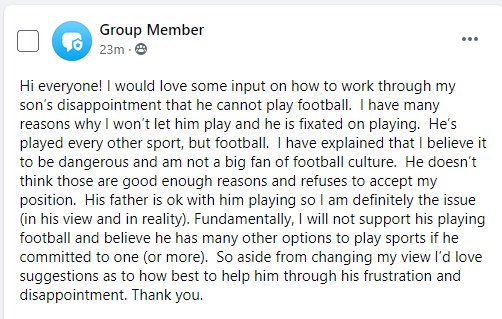
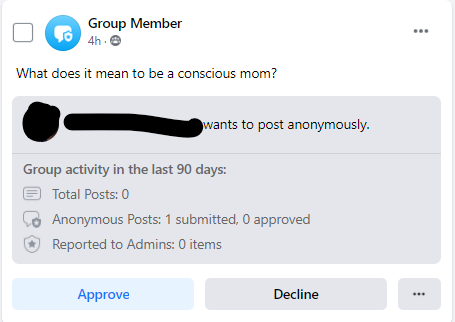
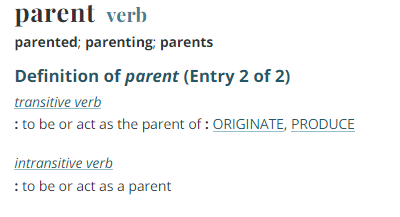
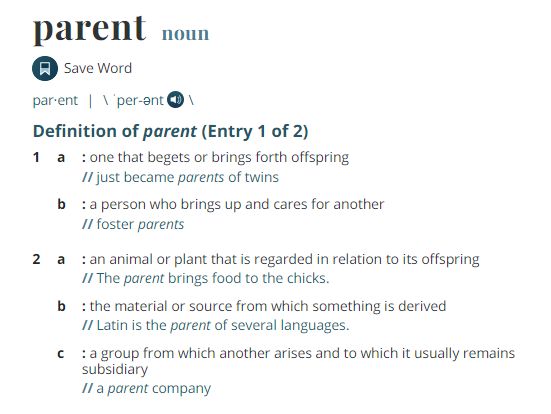
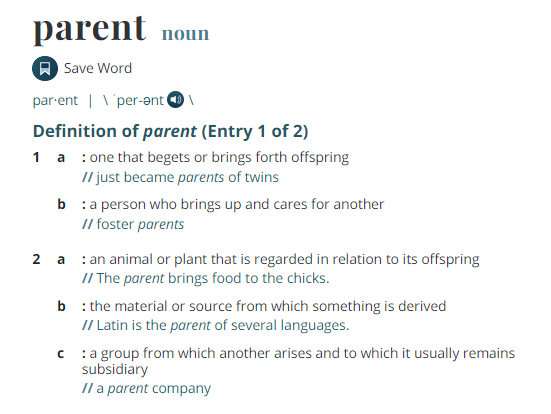
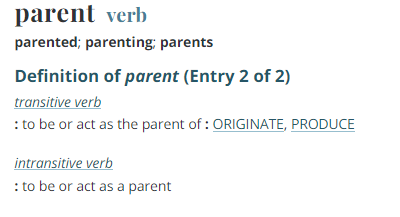


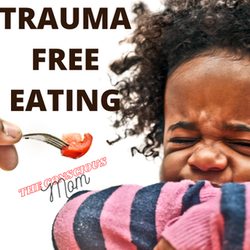



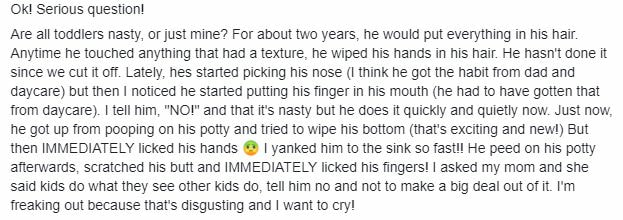

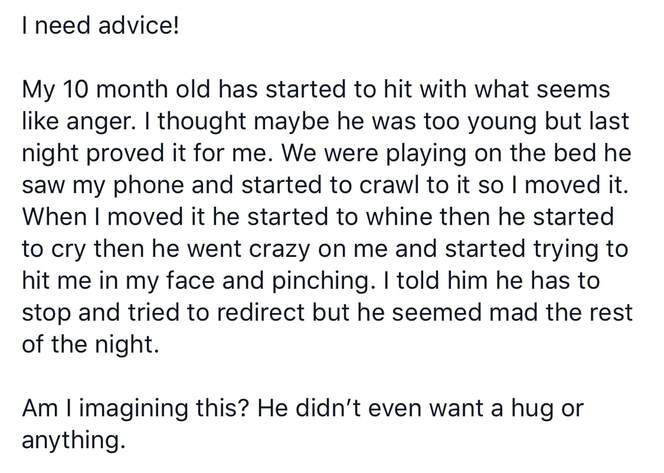
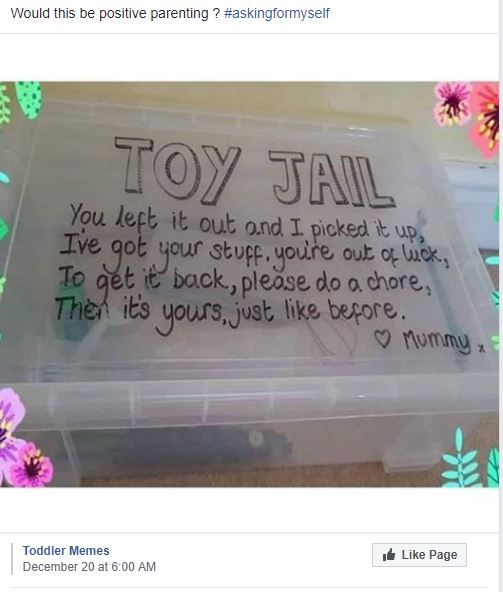
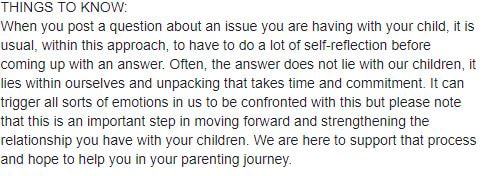

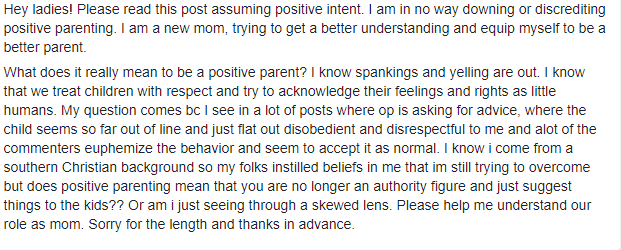

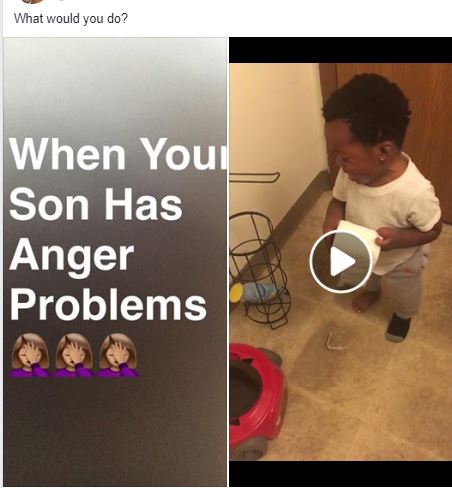

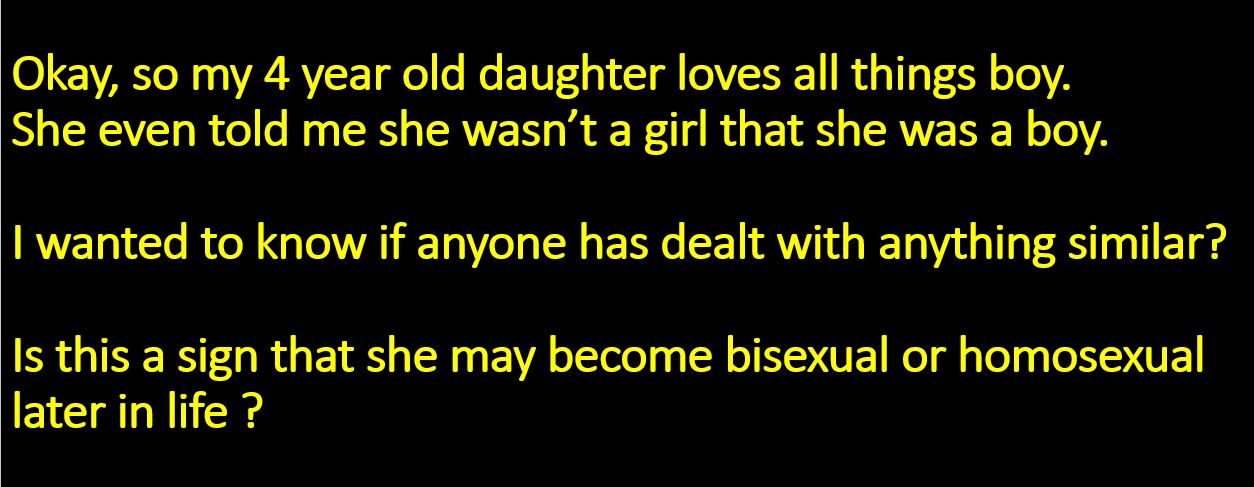

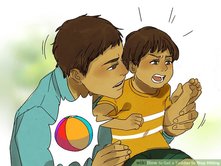

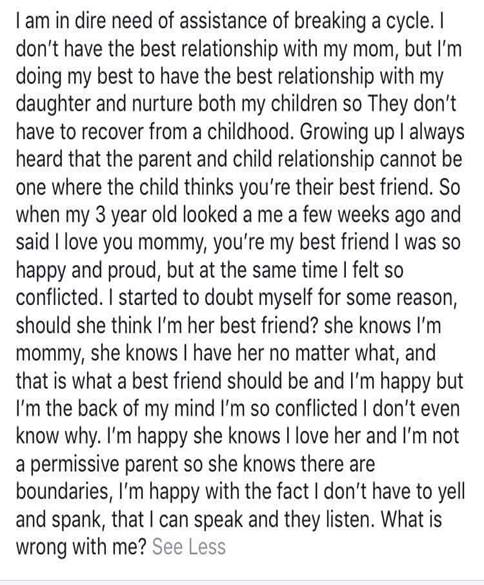

 RSS Feed
RSS Feed
